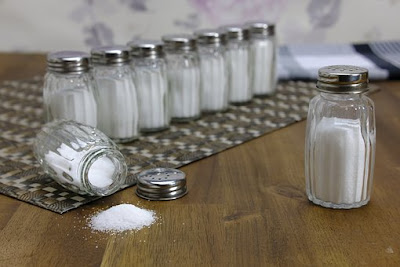Negative Effects too Much Salt SODIUM) ON YOUR BODY?
The negative effects of having too much salt circulating your body by better understanding the effects of salt on your body you may better be prepared to manage and restrict restrict your salt intake when appropriate if you haven't watched my brief lecture on how salt specifically raises your blood pressure I would encourage you to check that out typically consuming too much salt is something that occurs over time in a disease process it contributes to our chronic diseases however I will briefly mention that there are some acute processes as well too much salt an acute setting can lead to something called hypernatremia or too much salt in your blood this occurs because of dysregulation of sodium water or both and this is a different disease entirely and so I'm going to focus strictly on the chronic effects of sodium and hypertension let's pretend for a moment that we're talking about patient acts who has chronic hypertension his son pretension has caused in part because he consumes far too much salt every day the American Heart Association recommends 1,500 milligrams per day but he consumes three times up 4,500 milligrams per day the following is a list of diseases he's at risk for secondary to his high salt levels in subsequent high blood pressure first thing is kidney damage over time the excess fluid and circulation and elevated blood pressure can actually damage the kidneys one of the roles of the kidney is to filter your blood remove waste products and toxic products and send them off to your bladder in the form of urine when your kidneys are damaged these natural filter stopped working as effectively as these filters stopped working talk to some toxic substances begin to build up in your bloodstream and can cause all kinds of secondary issues this is why people with end-stage kidney disease require dialysis because their kidneys are no longer filtering or functioning appropriately and we use a machine to substitute that job for them the second thing is arterial damage chronically elevated blood pressure puts stress on the walls of your arteries because these arteries need to maintain pressure at the begin to thicken and stiffen to compensate for that increased pressureThis process is known as arteriosclerosis or hardening of the arteries at the same time these thickened arteries can actually begin to narrow leading to arterial stenosis or narrowing of the arteries this combination of hardening and narrowing is a setup for disaster over time these damaged arteries can dilate in bursts perform blood clots they send elsewhere or get so narrow that blood can no longer flow through them properly and since the arteries job is deliver oxygen aided blood to the organs that they flow into this can lead to organ damage downstream as those organs become deprived of oxygen the third thing it can really do is heart damage several things happen to heart muscle and arteries when chronically elevated blood pressure under these stress of pumping against that high blood pressure the heart muscle actually hypertrophy or gets bigger much like skeletal muscle and an athlete these the arteries of the heart known as the coronary arteries also can narrow stiffen like arteries anywhere else now fortunately the increase in heart muscle means that it requires more oxygen to do its job and when combined with those narrow and hardened arteries you have the classic setup for a heart attack high salt can also cause brain damage the arterial damage I mentioned can lead to reduced blood flow to the brain the narrowing and a hardening of the arteries can occur in the arteries of the neck known as the carotid arteries as this process evolved if the blood pressure remains elevated parts of the narrowed carotid artery can break off under pressure and it can end up somewhere on the brain circulation once there the oxygen deprived branches you can die leading to a full-blown stroke another way that this can manifest is a series of mini strokes over time that can cause a type of dementia known as vascular dementia there are a few other things that can also occur chronically elevated sodium has been linked to osteoporosis stomach cancer kidney stones and headaches in addition to putting you at risk for the other diseases have you sought to take Kim manifests with these signs and symptoms and they're all essentially signs of water retention it includes puffiness bloating weight gain and excessive thirst so in conclusion just a few key points here chronically consuming too much salt or sodium can lead to hypertension hypertension can lead to damage to your kidneys heart brain and blood vessels it also increases your risk for osteoporosis stomach cancer kidney stones and headaches and you may also notice puffiness bloating weight gain and excessive thirst...


No comments:
Post a Comment